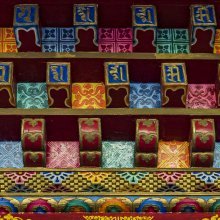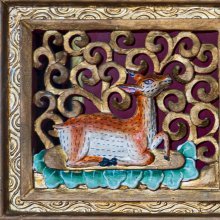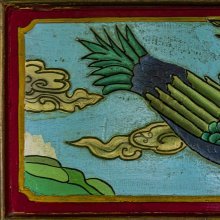Khada, Khāda, Khādā: 15 definitions
Introduction:
Khada means something in Hinduism, Sanskrit, Buddhism, Pali, the history of ancient India, Marathi, Hindi. If you want to know the exact meaning, history, etymology or English translation of this term then check out the descriptions on this page. Add your comment or reference to a book if you want to contribute to this summary article.
Images (photo gallery)
(+20 more images available)
In Hinduism
Ayurveda (science of life)
Source: gurumukhi.ru: Ayurveda glossary of termsKhaḍā (खडा):—Is a special kind of Soup (Yusha) prepared out of 4 parts of Takra (Butter milk) and 1 / 16 part of Samidhanya (pulse) like Green gram, black gram, horse gram etc, bolied together. When pulses are cooked completely salt, ginger, pepper are added and seasoned with ghee and cumin seeds.

Āyurveda (आयुर्वेद, ayurveda) is a branch of Indian science dealing with medicine, herbalism, taxology, anatomy, surgery, alchemy and related topics. Traditional practice of Āyurveda in ancient India dates back to at least the first millenium BC. Literature is commonly written in Sanskrit using various poetic metres.
India history and geography
Source: Cologne Digital Sanskrit Dictionaries: Indian Epigraphical GlossaryKhada.—(LP), grass. Note: khada is defined in the “Indian epigraphical glossary” as it can be found on ancient inscriptions commonly written in Sanskrit, Prakrit or Dravidian languages.

The history of India traces the identification of countries, villages, towns and other regions of India, as well as mythology, zoology, royal dynasties, rulers, tribes, local festivities and traditions and regional languages. Ancient India enjoyed religious freedom and encourages the path of Dharma, a concept common to Buddhism, Hinduism, and Jainism.
Languages of India and abroad
Pali-English dictionary
Source: Sutta: The Pali Text Society's Pali-English DictionaryKhāda, (nt.) eating, in —kāraṇa the reason of eating ... PvA. 37. (Page 236)
— or —
Khādā, (f.) food, in rāja° royal food Sn. 831 (rājakhādāya puṭṭho=rājakhādanīyena rājabhojanīyena posito Nd1 171; where printed °khadāya throughout). (Page 236)

Pali is the language of the Tipiṭaka, which is the sacred canon of Theravāda Buddhism and contains much of the Buddha’s speech. Closeley related to Sanskrit, both languages are used interchangeably between religions.
Marathi-English dictionary
Source: DDSA: The Molesworth Marathi and English Dictionarykhaḍa (खड).—f R Short tender grass. 2 Food of cattle (grass, grain, oilcake &c.)
--- OR ---
khaḍā (खडा).—m A small stone, a pebble. 2 A nodule (of lime &c.): a lump or bit (as of gum, assafœtida, catechu, sugar-candy): the gem or stone of a ring or trinket: a lump of hardened fæces or scybala: a nodule or lump gen. 3 A minor ḍhēpa or mass of gūḷa. 4 A radius of an umbrella-frame. khaḍā uḍaṇēṃ g. of s. (The leaping up of the khaḍā of a guḍaguḍī when the tobacco is smoked out.) To be utterly spent or consumed--money, materials. khaḍā ṭākūna ṭhāva ghēṇēṃ (To try the bottom by casting in a pebble.) To try, by some little experiment or effort, the nature or quality of. khaḍā phuṭaṇēṃ Expresses the opening of the rock and the gushing forth of water. Ex. nadīcā khaḍā or jaminīcā khaḍā ajhūna phuṭalā nāhīṃ. khaḍē khāṇēṃ (To eat pebbles.) To toil, drudge, or suffer annoyance and vexation (as in a troublesome business). khaḍē khāvaviṇēṃ or cāraṇēṃ (To feed with pebbles.) To annoy, harass, worry, oppress grievously. khaḍē ghāsaṇēṃ or phōḍaṇēṃ (nāvānēṃ g. of o.) To be excited into fury at the mention of. 2 (Without nāvānēṃ) To toil, drudge, fag. khaḍē mōjaṇēṃ To reckon with (calculi) pebbles, to calculate. khaḍyā khaḍyānīṃ ḍōkēṃ phuṭaṇēṃ g. of s. (To have one's head broken by many stones.) It is not one thing but many little things which bankrupt or ruin a man. khaḍyānnīṃ ḍōkēṃ phōḍaṇēṃ To throw stones at a man's head (lightly and gently) by way of expiating his sin of having killed a cow by throwing a stone at her. khaḍyāsārakhā nivaḍaṇēṃ To cast out or reject as worthless. And khaḍyāsāra- khā bāhēra paḍaṇēṃ To fall out or aside as worthless.
--- OR ---
khaḍā (खडा).—a ( H) Standing, perpetual, constant, not occasional. Ex. tyācē daravājyāvara khaḍā pāharā asatō. 2 Unclosed, not finally entered with the due detail and order--accounts: also not determined upon; standing over; not rejected nor accepted--a bill or draft.
--- OR ---
khāḍa (खाड).—n P The beard and whiskers. Rather contemptuously. Pr. khāḍāsa vēgaḷēṃ bōḍāsa vēgaḷēṃ (kōṇa dētō?) Who'll make distinction betwixt little matters? 3 f (Commonly khāḍī) A creek or an inlet. 3 A pit or hole.
--- OR ---
khāḍā (खाडा).—m Intermission, suspension, pause (in a work or course): also a day or a single time of intermission, a break, a gap, a vacant day. Ex. tyā kāmāsa cāra rōja khāḍā paḍalā; tyā mahinyānta tujhē cāra khāḍē jhālē. 2 A hole, pit, hollow, any sunken or depressed spot. 3 fig. (A banian-day, Hollowness or voidness.) Noneness (esp. of any article of provision, or of water or rain). 4 Used as a khāḍā divasa-tithi-vēḷa-kāḷa A blank day &c. khāḍyānta utaraṇēṃ-ghālaṇēṃ-pāḍaṇēṃ-ṭākaṇēṃ (māṇasāsa) To cast (a person) into ruin, loss, poverty &c.: (paiśāsa-ḍāgi- nyāsa-gāhaṇāsa) To embezzle or fraudulently appropriate (money &c.) khāḍayānta paḍaṇēṃ To incur ruin or loss.
--- OR ---
khāda (खाद).—f (Misused for khāja) An itching. v suṭa.
--- OR ---
khāda (खाद).—f (khādya S) Food, provision, aliment, pabulum. Pr. khāda taśī lāta As the food so the kick (i. e. force or strength). Pr. kārakunācēṃ li- hiṇēṃ undirācī khāda. Pr. khāda āhē tara lādha āhē. 2 Good living; nutritious diet. Pr. khāda harī vyādha. 3 The nibbling and gnawing (of mice &c.): the pecking of birds (as at fruit): the devouring of cattle (falling upon a corn field): the picking and pilling (as by a village-officer): the peculating and embezzling (as of a public servant): also the article, field &c. nibbled, gnawed, pecked, devoured: also the money or goods extorted, swallowed, embezzled &c. 4 (Consumption of the fire.) Waste in melting.
Source: DDSA: The Aryabhusan school dictionary, Marathi-Englishkhaḍa (खड).—f Short, tender grass; food of cattle.
--- OR ---
khaḍā (खडा).—m A pebble; a nodule. A gem. a Perpetual; standing. khaḍā ṭākūna pāhaṇēṃ Just to feel one's way slightly in order to gauge the probability of ac- complishing one's object. khaḍē khāvaviṇēṃ Oppress grievously; humble. khaḍē phōḍaṇēṃ To slander; blame, vilify. khaḍyāsārakhā nivaḍaṇēṃ To cast out as worthless.
--- OR ---
khāḍa (खाड).—n The beard and whiskers. f A creek or inlet. A pit or hole.
--- OR ---
khāḍā (खाडा).—m Intermission; a break. A pit. khā- ḍyānta paḍaṇēṃ Incur ruin of loss. khāḍyānta pā- ḍaṇēṃ-ghālaṇēṃ Cast (a person) into ruin.
--- OR ---
khāda (खाद).—f Food. Good living. Devouring. Embezzling. The thing embezzled. khāda taśī lātha As the food so the kick, i.e. the strength.
Marathi is an Indo-European language having over 70 million native speakers people in (predominantly) Maharashtra India. Marathi, like many other Indo-Aryan languages, evolved from early forms of Prakrit, which itself is a subset of Sanskrit, one of the most ancient languages of the world.
Sanskrit dictionary
Source: DDSA: The practical Sanskrit-English dictionaryKhaḍa (खड).—
1) Breaking, dividing.
2) Butter milk boiled with acid vegetables and spices.
Derivable forms: khaḍaḥ (खडः).
--- OR ---
Khāda (खाद).—a. Eating, devouring.
-daḥ 1 Eating, chewing.
2) Food; यत् पुरा परिवेषात् खादमाहरन्ति (yat purā pariveṣāt khādamāharanti) Av.9.6.12.
Source: Cologne Digital Sanskrit Dictionaries: Edgerton Buddhist Hybrid Sanskrit DictionaryKhadā (खदा).—(-khadā), pit; see agnikhadā; also aṅgārakhadā, pit of coals, Avadāna-śataka i.221.8 eṣāṅgārakhadā mahābhayakarī. See Wogihara, Lex. 26, where however it is said that the Buddhists use khadā only in agnikhadā (ignoring the above).
--- OR ---
Khāḍa (खाड).—[, error for khoḍa, q.v.: Mahāvastu ii.150.9, and (ed., without ms. authority) 152.3.]
Source: Cologne Digital Sanskrit Dictionaries: Shabda-Sagara Sanskrit-English DictionaryKhaḍa (खड).—m.
(-ḍaḥ) 1. Breaking, dividing. 2. Buttermilk boiled with acid vegetables and spices. 3. A small grass. f. (-ḍī) Chalk. E. khaḍ. to break, &c. affix ac.
Source: Cologne Digital Sanskrit Dictionaries: Cappeller Sanskrit-English DictionaryKhaḍa (खड).—[masculine] a kind of sour drink.
--- OR ---
Khadā (खदा).—[feminine] hut, stable.
--- OR ---
Khāda (खाद).—[adjective] eating, devouring (—°); [neuter] eating, food.
Source: Cologne Digital Sanskrit Dictionaries: Monier-Williams Sanskrit-English Dictionary1) Khaḍa (खड):—[from khaḍ] m. ([gana] madhv-ādi) dividing, breaking, [cf. Lexicographers, esp. such as amarasiṃha, halāyudha, hemacandra, etc.]
2) [v.s. ...] buttermilk boiled with acid vegetables and spices, [Caraka vi, 9; Suśruta i, vi]
3) [v.s. ...] Name of a man [gana] aśvādi
4) [v.s. ...] mn. (= khaṭa) a kind of small grass, straw, [cf. Lexicographers, esp. such as amarasiṃha, halāyudha, hemacandra, etc.]
5) Khadā (खदा):—[from khad] f. a hut, stable (a natural cavern?), [Kauśika-sūtra]
6) Khāda (खाद):—[from khād] mfn. ‘eating, devouring’ ifc. See amitraand vṛtra-khāda
7) [v.s. ...] m. eating, devouring, [Aitareya-brāhmaṇa v, 12, 10]
8) [v.s. ...] food, [Atharva-veda ix, 6, 12; Śatapatha-brāhmaṇa xiii, 4, 2, 17.]
Source: Cologne Digital Sanskrit Dictionaries: Yates Sanskrit-English Dictionary1) Khaḍa (खड):—(ḍaḥ) 1. m. Breaking; buttermilk with spices; small grass. f. (ḍī) Chalk.
2) Khada (खद):—khadati 1. a. To be steady or firm; to kill, to eat. (ka) khadayati 10. a. To cover, to screen.
Source: DDSA: Paia-sadda-mahannavo; a comprehensive Prakrit Hindi dictionary (S)Khāda (खाद) in the Sanskrit language is related to the Prakrit word: Khāya.
[Sanskrit to German]
Sanskrit, also spelled संस्कृतम् (saṃskṛtam), is an ancient language of India commonly seen as the grandmother of the Indo-European language family (even English!). Closely allied with Prakrit and Pali, Sanskrit is more exhaustive in both grammar and terms and has the most extensive collection of literature in the world, greatly surpassing its sister-languages Greek and Latin.
Hindi dictionary
Source: DDSA: A practical Hindi-English dictionary1) Khaḍā (खडा):—(a) standing, erect; upright, straight; vertical; steep, high; stationary; unreaped (as [khaḍā kheta]); whole, entire; [khaḍe-khaḍe] at once, there and then, instantly; standing a long while; —[honā] to stand (for election etc.)
2) Khāda (खाद) [Also spelled khad]:—(nf) manure, fertilizer.
...
See also (Relevant definitions)
Starts with (+120): Khada Kana-Kara-Dini-Dishi, Khada-Kana-Kana-Kara, Khadabada, Khadabadakhunta, Khadabadanem, Khadabadata, Khadabadita, Khadabrahmi, Khadabudanem, Khadaci, Khadada, Khadadakurakula, Khadadamavasa, Khadadanem, Khadag, Khadagala, Khadagayi, Khadagdant, Khadagdat, Khadaghata.
Ends with (+79): Agnikhada, Akhada, Akhkhada, Akkalakhada, Akkhada, Alubakhada, Amitrakhada, Anuvakkhada, Arakhada, Arekhada, Arubakhada, Asankhada, Asthikhada, Avakhada, Bahramase-akhada, Bakarakhada, Bokhada, Bomrakhada, Borakhada, Bundakhada.
Full-text (+76): Khadayana, Khadas, Avakhada, Agnikhada, Khadavant, Khadi, Khadakhadanem, Yavakhada, Khadonmatta, Khad, Amitrakhada, Vikhada, Khadavat, Khaya, Orakhada, Khandakhattaka, Khadyanakhada, Adakhanem, Pankharakhada, Khadyavagha.
Relevant text
Search found 9 books and stories containing Khada, Khāda, Khādā, Khaḍa, Khaḍā, Khāḍa, Khāḍā, Khadā, Khadaa; (plurals include: Khadas, Khādas, Khādās, Khaḍas, Khaḍās, Khāḍas, Khāḍās, Khadās, Khadaas). You can also click to the full overview containing English textual excerpts. Below are direct links for the most relevant articles:
Chaitanya Bhagavata (by Bhumipati Dāsa)
Verse 2.10.184 < [Chapter 10 - Conclusion of the Lord’s Mahā-prakāśa Pastimes]
Verse 2.10.185 < [Chapter 10 - Conclusion of the Lord’s Mahā-prakāśa Pastimes]
Introduction to chapter 10 < [Chapter 10 - Conclusion of the Lord’s Mahā-prakāśa Pastimes]
Rig Veda (translation and commentary) (by H. H. Wilson)
Amaravati Art in the Context of Andhra Archaeology (by Sreyashi Ray chowdhuri)
Epigraphs from Amarāvatī (a) The Gahapati and Setti classes < [Chapter 4 - Survival of Amarāvatī in the Context of Andhra Art]
Yoga Vasistha [English], Volume 1-4 (by Vihari-Lala Mitra)
Chapter XLVI - Onslaught of viduratha < [Book III - Utpatti khanda (utpatti khanda)]
Atharvaveda and Charaka Samhita (by Laxmi Maji)
Arśa (piles) according to Caraka < [Chapter 4 - Diseases and Remedial measures (described in Caraka-saṃhitā)]
2b. Tuberculosis (Yakṣmā or Rājayakṣmā) in the Caraka-Saṃhita < [Chapter 5 - Diseases and Remedies in Atharvaveda and Caraka-Saṃhitā]
Trishashti Shalaka Purusha Caritra (by Helen M. Johnson)
Part 7: War between Kūṇika and Ceṭaka < [Chapter XII - Omniscience and wandering of Mahāvīra]





